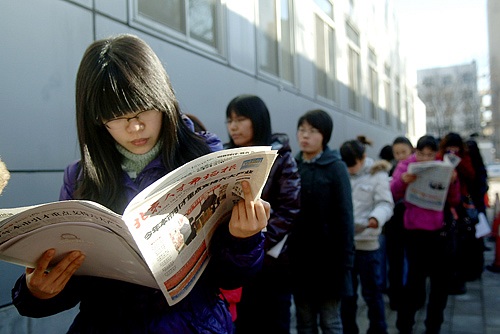|
 |
|
EXTRA TEST: Job seekers wait to enter an employment fair for female college students in Beijing on March 2 (ZHAO WANWEI) |
Flexible Assistance
The National Development and Reform Commission (NDRC), China's top economic planner, has ordered local governments to establish a mechanism to peg benefits for low-income families with price levels by the end of the year.
Under the mechanism, if the consumer price index (CPI) rises to a certain limit, to be decided by local governments, extra money will be given to low-income families on top of the monthly benefit.
If the CPI has risen for several consecutive months, local governments can decide to raise the previous standards, said a circular posted on the NDRC website.
"We should make it a permanent mechanism to make sure the basic living standards of low-income families are not affected by rising prices," said Zhou Wangjun, Deputy Director of the NDRC's Pricing Department.
Safe Vaccine
The latest World Health Organization (WHO) assessment shows China is complying with international standards for vaccine regulation.
China's national regulatory authorities, represented by the State Food and Drug Administration (SFDA), were recognized by the WHO as "functional," said Lahouari Belgharbi, a scientist of the WHO Department of Immunization, Vaccines and Biologicals, at a conference in Beijing on March 1.
China is the 36th vaccine producing country that has had its regulatory system assessed as qualified by the WHO.
With a regulatory system for vaccines documented to comply with international standards, vaccine manufacturers in China are eligible to apply to the WHO for prequalification of vaccines.
This could eventually open the door for vaccines produced in China to be supplied through UN agencies to developing countries, according to a statement on the WHO website.
Currently, China has 36 vaccine plants to produce 49 kinds of vaccines against 27 diseases, with annual capacity of nearly 1 billion doses, according to SFDA statistics.
Food Additives Ban
A ban on the production and use of two food additives in flour processing will take effect on May 1.
The two additives, benzoyl peroxide and calcium peroxide, were banned because "there is no need to use them in flour processing anymore" as the country's processing techniques and wheat planting had improved, the Ministry of Health said in a statement on its website on March 1.
Targeting illegal food additives in China's food safety overhaul last year, authorities have cracked down on 5,305 related cases and confiscated more than 19.8 million yuan ($3.01 million) of illegal gains and goods worth more than 60 million yuan ($9.39 million), the ministry's figures show.
National Headcount
Preliminary statistics show China had 1.341 billion people at the end of last year, the National Bureau of Statistics (NBS) said on February 28.
The country's population stood at 1.335 billion at the end of 2009 and 1.328 billion at the end of 2008.
China is scheduled to release the final count in April, which is based on the country's sixth national population census held last November, the NBS said in a statistical communiqué on China's national economy and social development in 2010.
According to the NBS communiqué, although China overtook Japan last year to be the world's second largest economy, it still had 26.88 million people living below the poverty line in the country's rural areas, which was 1,274 yuan ($193) last year. That figure was 9.09 million less compared with that in 2009. | 